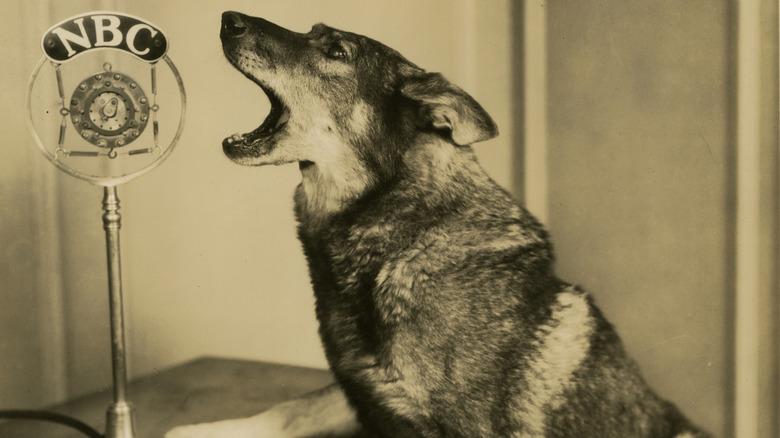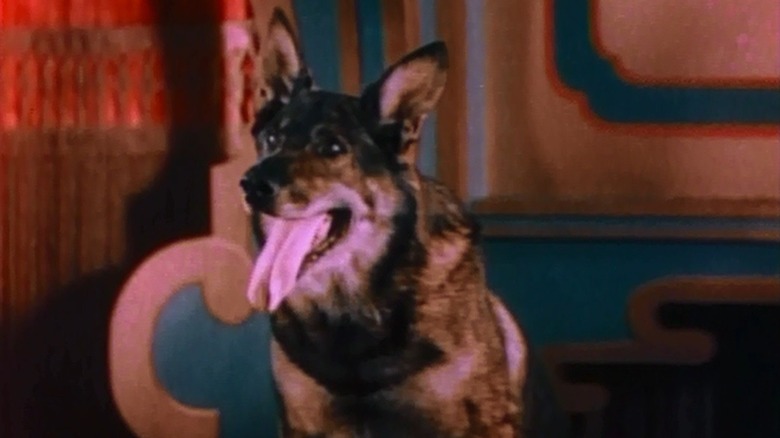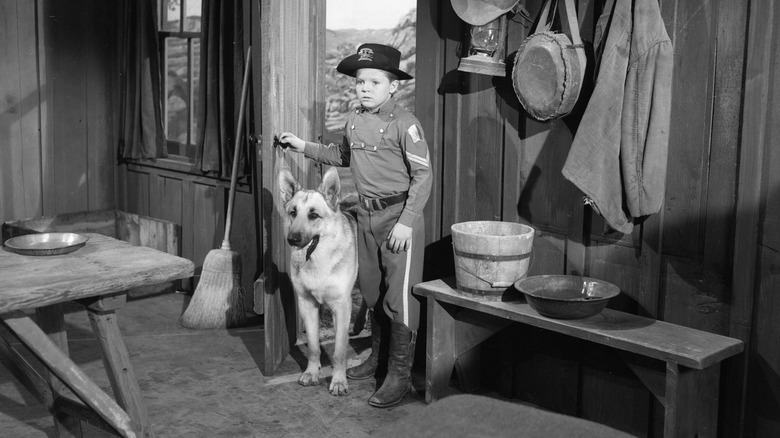
Visual Studies Workshop/Getty Images
If you're under the age of 60, it's possible you don't know who Rin Tin Tin is. This is a pity, as there was a time when Rin Tin Tin was one of the biggest movie stars on the planet. Born in Fliery, France in 1918, Rin Tin Tin (sometimes called Rinty for short) was a German Shepherd found on a French battlefield by an American solider named Lee Duncan, fighting in World War I. Returning from the war, Duncan trained Rinty to perform on camera and merely walked the dog from studio to studio, asking if they were looking for a performing animal. Rin Tin Tin made his film debut in the 1922 film "The Man from Hell's River," replacing a persnickety wolf. He would go on to play a Wolf Dog in the 1923 film "Where the North Begins," launching the popular pooch into the mainstream.
Throughout the 1920s, Rin Tin Tin would come to headline over 20 movies, often playing himself. He was one of the best-trained dogs in Hollywood, and became the advertising face of several dog-related products. Some ticket sales estimates have Rin Tin Tin as the highest-grossing movie star of the era, although those numbers can't be wholly substantiated. Sadly, many of Rin Tin Tin's films have been lost to the ravages of time. Luckily, audiences can still watch the dog's first color movie, John G. Adolfi's "The Show of Shows," a high-profile revue film with singers, dancers, a Shakespeare scene, and one heck of a dog act.
In the 2011 biography "Rin Tin Tin: The Life and the Legend" by Susan Orlean (whose book "The Orchard Thief" was the inspiration for the Nicolas Cage-led "Adaptation'), a legend began that has persisted in Hollywood for a while. Orlean claimed, repeatedly (including in an article in the New Yorker), that Rin Tin Tin received enough votes to win Best Actor at the very first Academy Awards (held on May 16, 1929). She said that Rinty was denied the award after the show's producers decided that awarding a dog wouldn't give the brand-new Awards the prestige that it deliberately sought.
Sadly, this is not true.
No, Rin Tin Tin did not win an Oscar for Best Actor

Warner Bros.
It should be remembered that the Academy Awards were not created to celebrate a growing art form, but were a deliberate and mercenary attempt by studio super-honcho Louis B. Mayer to discourage Hollywood players from unionizing. /Film has written about Mayer's Oscars machinations in the past and how his attitudes toward unions were based in the personal costs he incurred while commissioning a ritzy home in Santa Monica, California. The Academy was formed as a means to distract laborers, directors, and actors with a symbolic bauble, a prize they could say had prestige.
With that in mind, it's reasonable that the Academy would indeed want the first Oscar to retain as much prestige as possible. Giving Best Actor to Rin Tin Tin would have robbed the ceremony of that prestige and completely undermined the entire purpose of the awards ceremony. Orlean's hypothesis sounds correct from this perspective.
But, as the Wrap pointed out in 2017, Rin Tin Tin's Oscar was all an urban legend. Orlean merely embellished a widely-spread myth about Rin Tin Tin's ballots and the subsequent embarrassment of the brand-new Academy. As the Wrap article pointed out, the ballots for the 1928 Academy Awards were all signed that year — it wasn't yet a secret ballot — and they were all preserved at the the Academy's Margaret Herrick Library, located in Los Angeles, California. One can look through the ballots and find that Rin Tin Tin's name was not written down on a single one of them. The dog star was a big enough star to keep Warner Bros. afloat, but no one actually voted for the good boy's good performance.
Where did the urban myth begin that Rin Tin Tin won Best Actor?

ABC
Note: the above photo is not of Rin Tin Tin, but of Rin Tin Tin IV as he appeared in the 1954 TV series "The Adventures of Rin Tin Tin." Everyone's favorite doggo was merely the first in a legacy of dog performers.
The origins of the Rin Tin Tin Oscars rumor lie in a story about Fox co-founder Daryl Zanuck, who was a Warner Bros. executive in 1929, and letters he shared with screenwriter Frank Woods, the Academy's first paid executive. Woods, running with Mayer's idea, liked the notion of the film industry giving out awards to the best films of the year and reached out to several executives, hoping to gain some support. Zanuck reportedly responded very negatively to the idea of the Academy Awards, finding the idea of an industry rewarding itself to be rather silly.
Zanuck, according to the Wrap article, wrote a snarky letter to Woods, including a fake version of his own ballot wherein he voted only for Warner Bros. productions. Why, Zanuck felt, would any executive vote for films from other studios? He also sarcastically wrote that Rin Tin Tin should be given the award for Best Actor. It was a joke.
Zanuck may very well have told his Rin Tin Tin joke to Jack Warner — the head of WB — and the lead exec went on to write his own jokey ballot which also listed Rin Tin Tin as Best Actor. Warner's ballot also jokingly wrote in Casey Jones (who died in 1900) in the now-moribund Best Engineering category.
Having Rin Tin Tin's name on two executive ballots, however, left some true believers tantalized, and rumors began to spread that the votes were serious. Soon, the rumor grew, and some claimed that Rin Tin Tin got enough votes to win Best Actor. The rumors lasted until 2011, when Orlean wrote her book.
The rumors are defintiely not true. Other outlets have debunked them. Rin Tin Tin is a very good boy, but he is not an Oscar winner.









 English (US) ·
English (US) ·